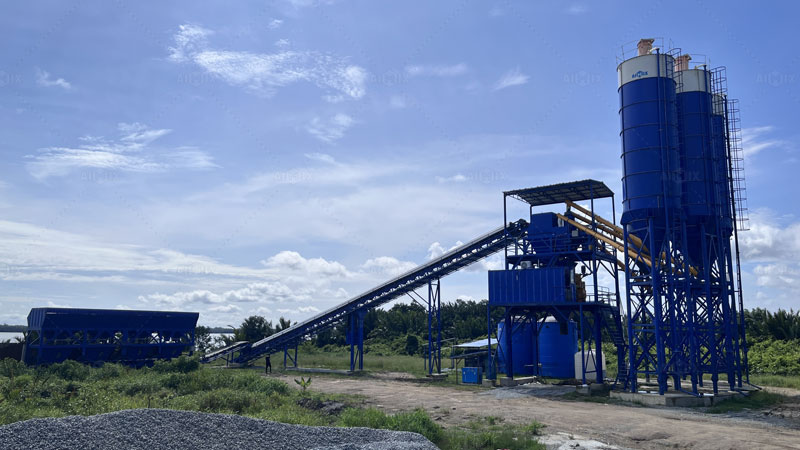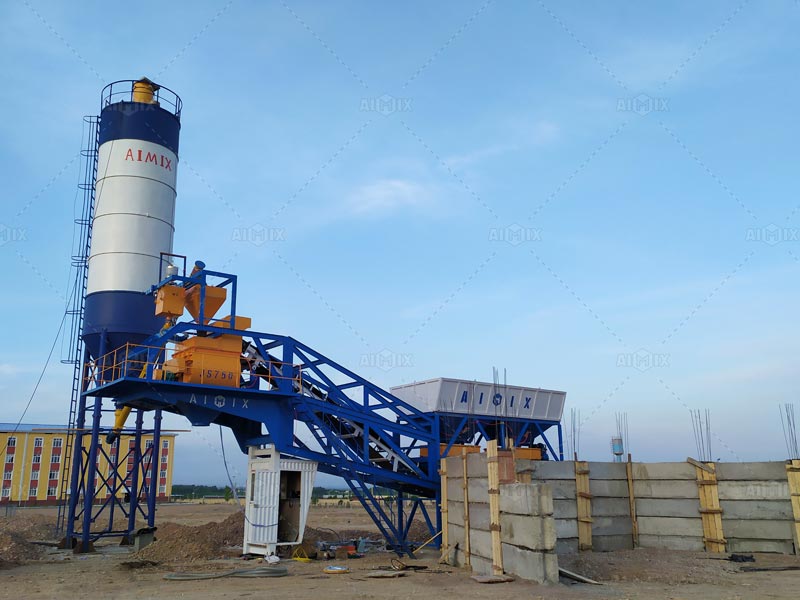Concrete plants are indispensable in the construction industry, enabling projects to maintain a consistent supply of high-quality concrete. Whether you’re tackling a small-scale building project or a large infrastructure endeavor, selecting the right concrete plant is critical. In this guide, we’ll explore the types of concrete plants, key factors to consider, and how to make the best choice for your construction needs.
What Is a Concrete Plant?
A concrete plant, also known as a batching plant(planta de concreto), is equipment designed to mix cement, water, sand, and aggregates in precise proportions to produce high-quality concrete. These plants range in size, type, and functionality to suit diverse construction needs. Choosing the correct one ensures operational efficiency, cost savings, and top-notch results.

Types of Concrete Plants
The selection of a concrete plant largely depends on the nature and scope of your project. Here are the primary types available:
1. Mobile Concrete Plants
A mobile concrete plant is perfect for projects requiring frequent relocation. These plants(plantas de concreto móviles) are compact, easy to transport, and quick to set up, making them ideal for road construction or temporary job sites. Their flexibility allows contractors to adjust to changing project requirements seamlessly.
2. Ready-Mix Concrete Plants
A ready-mix concrete plant produces pre-mixed concrete, delivered to construction sites in transit mixers. This type is ideal for large-scale projects that demand a consistent concrete supply with minimal onsite mixing. Ready-mix plants are widely used in commercial construction and infrastructure development.
3. Stationary Concrete Plants
Stationary concrete plants are permanent installations with high production capacities. These are best suited for large, ongoing projects such as dams, bridges, and highways where consistent concrete quality is paramount.

Key Considerations When Choosing a Concrete Plant
Selecting the right plant involves evaluating your project’s specific needs. Below are critical factors to consider:
1. Project Scale and Requirements
Assess the size and scope of your construction project. Small-scale projects may only require a mobile plant, while large-scale endeavors like highway construction benefit from stationary or ready-mix concrete plants.
2. Production Capacity
Determine your project’s daily concrete requirements. Choosing a plant with adequate capacity ensures smooth operations without interruptions. Overestimating or underestimating capacity can lead to inefficiencies and cost overruns.
3. Site Conditions
Analyze the location and accessibility of your construction site. For remote or hard-to-reach areas, a mobile concrete plant is the most practical option due to its portability. Urban sites may favor ready-mix solutions for convenience and reduced transportation costs.
4. Budget Constraints
Your budget plays a crucial role in the decision-making process. Consider the initial cost, operational expenses, and long-term value of the plant. Look for a concrete plant for sale(plantas de concreto en venta) that offers the best balance between affordability and features.
5. Environmental Impact
Sustainability is increasingly important in construction. Opt for plants with dust control systems, energy-efficient motors, and water recycling features to minimize environmental impact.
6. Maintenance and After-Sales Support
Choose a concrete plant from a manufacturer that provides comprehensive after-sales support. Regular maintenance and readily available spare parts ensure uninterrupted operations.
Benefits of Mobile Concrete Plants
Mobile concrete plants have become increasingly popular due to their versatility and efficiency. Here are the key advantages:
- Portability: Quick and easy relocation makes them suitable for short-term projects.
- Time Efficiency: Faster setup and dismantling save valuable time.
- Cost Savings: Reduces transportation costs by producing concrete onsite.
- Customizable Output: Tailor concrete production to meet specific project requirements.
Why Choose a Ready-Mix Concrete Plant?
Ready-mix concrete plants are the go-to choice for many large-scale projects. Here’s why:
- Consistent Quality: Automated systems ensure uniform mixing, reducing errors.
- Convenience: Concrete is delivered to the site, eliminating the need for onsite mixing.
- Scalability: Ideal for projects that require high volumes of concrete in a short period.
Comparing Mobile and Ready-Mix Concrete Plants
Choosing between a mobile concrete plant and a ready-mix concrete plant(planta de concreto premezclado) depends on your project’s needs. Here’s a quick comparison:
| Feature | Mobile Concrete Plant | Ready-Mix Concrete Plant |
|---|---|---|
| Mobility | High | Low |
| Installation Time | Quick | Longer |
| Ideal for | Temporary or remote projects | Large-scale, consistent demand |
| Cost | Lower upfront costs | Higher operational costs |
How to Find the Best Concrete Plant for Sale
Purchasing a concrete plant is a significant investment. Follow these steps to find the best option:
- Research Manufacturers: Choose reputable suppliers with a proven track record of producing durable, efficient plants.
- Assess Features: Evaluate the plant’s specifications, such as production capacity, automation level, and environmental features.
- Check Reviews: Look for feedback from other buyers to gauge performance and reliability.
- Prioritize After-Sales Support: Ensure the manufacturer offers maintenance, training, and spare parts.
- Compare Costs: Balance quality with affordability. A low-cost plant may lead to higher maintenance expenses over time.
Trends in Concrete Plant Technology
The construction industry is rapidly adopting innovations in concrete plant technology. Modern plants feature:
- Advanced Automation: Cutting-edge control systems enhance precision and reduce labor requirements.
- Eco-Friendly Features: Plants now focus on reducing emissions, conserving energy, and recycling water.
- Compact Designs: Portable options make it easier to manage space-constrained projects.
Conclusion
Choosing the right concrete plant is a critical step toward ensuring the success of your construction project. Whether you need the flexibility of a mobile concrete plant, the efficiency of a ready-mix concrete plant, or the stability of a stationary plant, understanding your requirements is essential. Evaluate factors like project scale, location, budget, and environmental considerations to make an informed decision.
For high-quality options, explore concrete plants for sale from reputable manufacturers. The right investment will boost your project’s efficiency, reduce costs, and deliver long-lasting results.